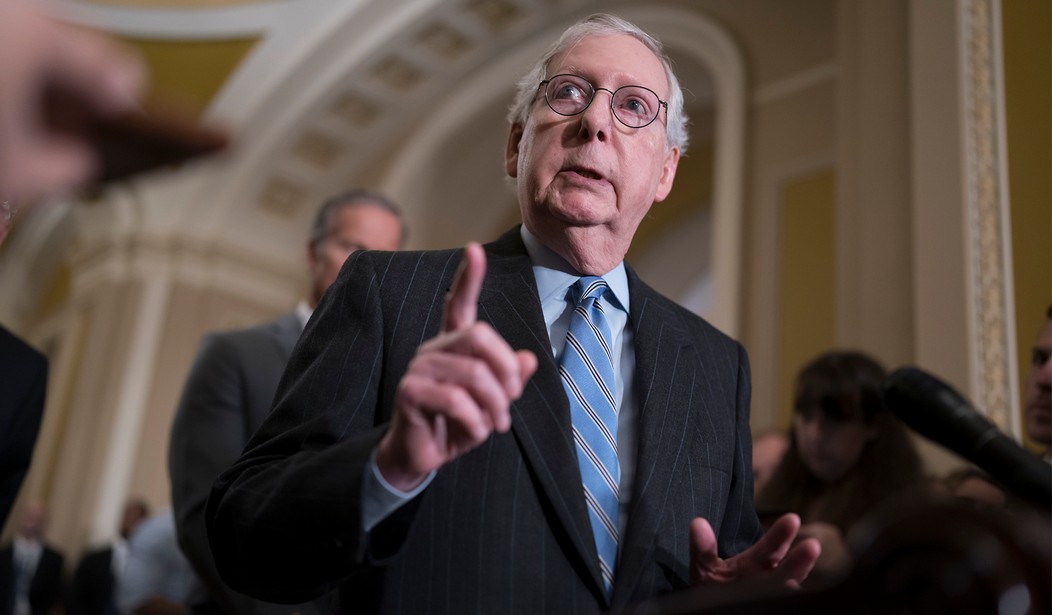Few lawmakers on Capitol Hill have generated more visceral reactions over the last six to seven years than Senate Republican Leader Mitch McConnell. From leftists to MAGA loyalists, McConnell has long been demonized for reasons — some of them valid, some of them ignorant — too numerous to recount.
For example, Donald Trump has not only called McConnell a “disloyal sleaze bag” — although McConnell says he most likes Trump’s “Old Crow” ad hominem — the former president has also demeaned former Transportation Secretary Elaine Chao, a Taiwanese native, as McConnell’s “China-loving wife, Coco Chow.”
Welp, if several sources are right, it looks like McConnell haters won’t have the 81-year-old senator to kick around much longer.
As reported by The Spectator on Thursday, “multiple sources confirm that Senators John Barrasso of Wyoming, John Cornyn of Texas, and John Thune of South Dakota are actively reaching out to fellow Republican senators in efforts to prepare for an anticipated leadership vote,” which will occur if McConnell retires as Republican Minority Leader, following his early March fall, during which he suffered a concussion.
Presumably, McConnell’s retirement from his leadership duties as leader would be part of his retirement from the Senate, itself. One source told The Spectator that jockeying for votes to replace McConnell as GOP Leader has already begun:
Cornyn has been particularly active in his preparations, taking fellow senators with whom he has little in common to lunch in attempts to court them. Requests are being targeted at a plethora of conservative senators, including the sixteen who voted to delay the leadership election earlier this year, a proxy for opposition to McConnell’s leadership.
Rick Scott, the Florida senator and former NRSC head who challenged McConnell, ultimately received ten protest votes. These members could prove key to determining the next Republican leader. Queries are also being made internally about the rules regarding replacement, and how the contest would be structured given the lack of an obvious heir apparent.
Kind of a “The King is dead, long live the King” thing, as it were.
But, wait— McConnell tweeted the following, Thursday afternoon:
I am looking forward to returning to the Senate on Monday. We’ve got important business to tackle and big fights to win for Kentuckians and the American people.
Well, now. Did The Turtle™ catch wind of the palace plot to replace him, was news of his pending “death” premature, or is his tweet a mere coincidence?
I am looking forward to returning to the Senate on Monday. We've got important business to tackle and big fights to win for Kentuckians and the American people.
— Leader McConnell (@LeaderMcConnell) April 13, 2023
RedState has chronicled, as well as participated in, both criticism and praise of McConnell over the years:
Mitch, Please: McConnell Goes Full RINO in Condemning Tucker Carlson and New J6 Video
Mitch McConnell and Candidate Quality Aren’t the GOP’s Only Problems
Personally? I believe — as is the case with many battles and differences of opinion — the truth about Mitch McConnell’s leadership of the Republican Party lies somewhere in the middle.
While McConnell haters gonna hate McConnell, the GOP Leader deserves credit for keeping left-wing ideologue Merrick Garland the hell off the U.S. Supreme Court and immense credit for delivering rapid confirmation of Trump nominee conservative Amy Coney Barrett to the high court.
Moreover, as PBS whined in October 2020, McConnell’s reshaping of the federal judiciary extended beyond the Supreme Court:
[While] Senate Majority Leader Mitch McConnell is widely credited with holding open a seat for President Donald Trump’s first Supreme Court appointee, Justice Neil Gorsuch, and shepherding through a second, Justice Brett Kavanaugh — and now, with the opening left by the passing of Justice Ruth Bader Ginsburg, potentially a third.
But McConnell’s crowning achievement may extend past the Supreme Court.
When President Trump took office, he had more than 100 vacancies to fill in the lower courts, including 17 in the U.S. Courts of Appeals — all of them lifetime appointments.
The Supreme Court hears around 80 cases a year, while the Courts of Appeals handle tens of thousands of cases annually — often making them the last word in most cases that impact the lives of Americans.
The bottom line: McConnell clearly understood the importance of the makeup of the lower courts of the judiciary, and more importantly, he delivered.
“Disloyal sleaze bag” aside, that is.















Join the conversation as a VIP Member